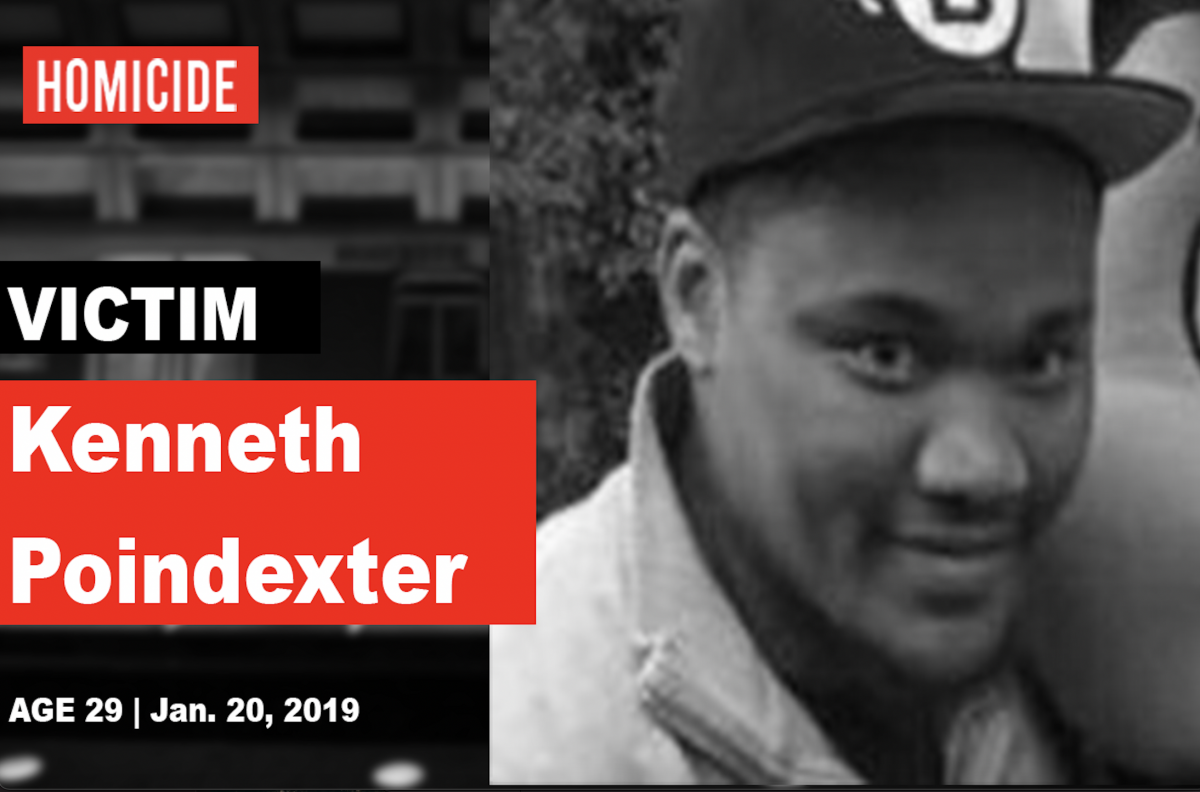
Thank you for reading D.C. Witness. Help us continue our mission into 2024.
Donate NowBy
Tory Lysik [former]
- November 2, 2021
Court
|
Daily Stories
|
Homicides
|
Shooting
|
Suspects
|
Victims
|
Steven Robin is charged with first-degree murder while armed in connection with the 2018 shooting of 29-year-old Kenneth Poindexter. The second day of his trial resumed with multiple key witnesses providing testimony.
Two other defendants, Edward Brown, 22, and Antonio McKenzie, 24, are also charged with first-degree murder while armed in connection with the shooting, which took place on the 4700 block of Benning Road, SE, on Jan. 18, 2018. Their cases were severed from 25-year-old Robin’s.
Charles Young, 30, pleaded guilty to accessory after the fact voluntary manslaughter for acting as the getaway driver during the shooting. He was sentenced to four years in prison, all of which were suspended, plus six months of probation on Oct. 28, D.C. Witness previously reported.
Many of the witnesses called by the prosecution during the Nov. 1 proceedings testified on the vehicle allegedly used to drive to and from the shooting, a white Mercedez-Benz. This includes two Metropolitan Police Department detectives. One of them, a former mobile crime tech who lifted fingerprints from the vehicle, identified a jacket, ski masks and a water bottle found in the vehicle. He was not cross-examined.
A forensic technician who analyzed the fingerprints found on the vehicle testified and gave a presentation on how exactly the process of identification works. He said they lift prints through a variety of methods depending on where they are found and what they are made with, then compare them with actual prints.
During the fingerprint analyzer’s cross-examination, he said there were no conclusive fingerprints tying Robin to the vehicle.
A witness who first testified when the trial began on Oct. 29 returned to the stand. During cross-examination, she continued to not give definitive answers to defense attorney Kristin McGough‘s questions.
“We’re going to be here a long time,” McGough said after receiving a vague answer from her. “Ok, I don’t remember,” the witness responded.
The witness said that, since there are a lot of people in the world to remember, she cannot remember the people McGough asked about in the days leading up to the shooting, especially because she was intoxicated during periods of the time. When McGough read from the witness’ previous testimony, which conflicted with her current statements, and asked if what she read aloud was what was also on the paper, the witness repeatedly said she does not remember.
McGough went through the days before the shooting, asking questions about a window that was broken by someone in the apartment the witness was staying in with her family and other people. The witness was unable to remember the window breaking at all or any events during that time. When McGough asked the witness if what she read from the witness’s previous testimony, which was different from what the witness was saying on the stand, she responded by saying, “you can read it if you know how to read.”
After a break, DC Superior Court Judge Danya Dayson told the witness she is “required to answer the questions.” The witness was also given an attorney to consult for legal advice going forward. All questions before the order are considered valid but she cannot plead the fifth or refuse to verify what the lawyers read from her previous testimony. Otherwise, she risks a contempt charge.
After the order and a break, the witness began answering questions. She was asked about a club that she and others allegedly attended before the shooting. McGough asked about a fight with an individual from that night.
When cross-referenced with video of her police testimony, the witness said she remembered in the police questioning and now she does not. She said she was intoxicated at the time of the police questioning, despite having told an officer that she was not.
McGough brought in Instagram data from the witness’ account. Messages were shown between her and Poindexter’s account, showing her talking to someone through his account and talking about how she was in a fight the night she went to the club.
A T-Mobile representative from their law enforcement relations division also briefly testified and verified the cell phone information used to show the defendants whereabouts at the time of the shooting.
The trial is scheduled to continue on Nov. 2.
Notifications are not yet available for this specific case. Please check back later for updates. Thank you.